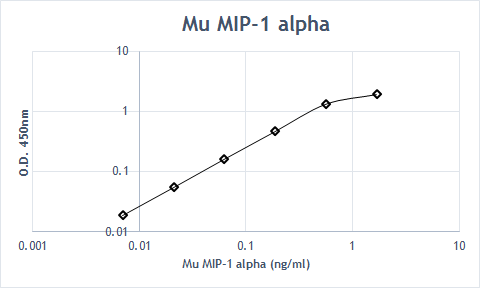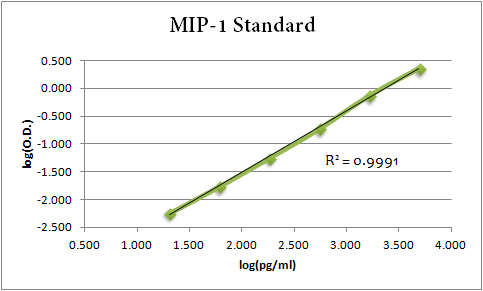Mouse CCL3/MIP-1 alpha Biotinylated Antibody Summary
Applications
Mouse CCL3/MIP-1 alpha Sandwich Immunoassay
Please Note: Optimal dilutions should be determined by each laboratory for each application. General Protocols are available in the Technical Information section on our website.
Reconstitution Calculator
Preparation and Storage
- 12 months from date of receipt, -20 to -70 degreesC as supplied. 1 month, 2 to 8 degreesC under sterile conditions after reconstitution. 6 months, -20 to -70 degreesC under sterile conditions after reconstitution.
Background: CCL3/MIP-1 alpha
The macrophage inflammatory proteins 1 alpha and 1 beta, two closely related but distinct proteins, were originally co-purified from medium conditioned by a LPS-stimulated murine macrophage cell line. Mature mouse MIP-1 alpha shares approximately 77% and 70% amino acid identity with human MIP-1 alpha and mouse MIP-1 beta, respectively. MIP-1 proteins are expressed primarily in T cells, B cells, and monocytes after antigen or mitogen stimulation. The MIP-1 proteins are members of the beta (C-C) subfamily of chemokines. Both MIP-1 alpha and MIP-1 beta are monocyte chemoattractants in vitro. Additionally, the MIP-1 proteins have been reported to have chemoattractant and adhesive effects on lymphocytes, with MIP-1 alpha and MIP-1 beta preferentially attracting CD8 + and CD4 + T cells, respectively. MIP-1 alpha has also been shown to attract B cells as well as eosinophils. MIP-1 proteins have been reported to have multiple effects on hematopoietic precursor cells and MIP-1 alpha has been identified as a stem cell inhibitory factor that can inhibit the proliferation of hematopoietic stem cells in vitro as well as in vivo. In the same assays, MIP-1 beta was reported to be much less active. The functional receptor for MIP-1 alpha has been identified as CCR1 and CCR5.
Product Datasheets
Citations for Mouse CCL3/MIP-1 alpha Biotinylated Antibody
R&D Systems personnel manually curate a database that contains references using R&D Systems products. The data collected includes not only links to publications in PubMed, but also provides information about sample types, species, and experimental conditions.
10
Citations: Showing 1 - 10
Filter your results:
Filter by:
-
Response patterns of cytokines/chemokines in two murine strains after irradiation.
Authors: Zhang M, Yin L, Zhang K, Sun W, Yang S, Zhang B, Salzman P, Wang W, Liu C, Vidyasagar S, Zhang L, Ju S, Okunieff P, Zhang L
Cytokine, 2012-01-25;58(2):169-77.
Species: Mouse
Sample Types: Plasma
Applications: Luminex Development -
Diesel exhaust particulates exacerbate asthma-like inflammation by increasing CXC chemokines.
Authors: Kim J, Natarajan S, Vaickus LJ, Bouchard JC, Beal D, Cruikshank WW, Remick DG
Am. J. Pathol., 2011-10-01;179(6):2730-9.
Species: Mouse
Sample Types: BALF
Applications: ELISA Development -
Resistance of human alveolar macrophages to Bacillus anthracis lethal toxin.
Authors: Wu W, Mehta H, Chakrabarty K, Booth JL, Duggan ES, Patel KB, Ballard JD, Coggeshall KM, Metcalf JP
J. Immunol., 2009-10-07;183(9):5799-806.
Species: Mouse
Sample Types: Cell Culture Supernates
Applications: ELISA Development -
Increased cytokine production in IL-18 receptor alpha-deficient cells is associated with dysregulation of suppressors of cytokine signaling (SOCS).
Authors: Nold-Petry CA, Nold MF, Nielsen JW, Bustamante A, Zepp JA, Storm KA, Hong JW, Kim SH, Dinarello CA
J. Biol. Chem., 2009-07-10;0(0):.
Species: Mouse
Sample Types: Cell Culture Supernates
Applications: ELISA Development -
Neutrophil recruitment in immunized mice depends on MIP-2 inducing the sequential release of MIP-1alpha, TNF-alpha and LTB(4).
Authors: Ramos CD, Fernandes KS, Canetti C, Teixeira MM, Silva JS, Cunha FQ
Eur. J. Immunol., 2006-08-01;36(8):2025-34.
Species: Mouse
Sample Types: Tissue Secretion
Applications: ELISA Development -
Selective macrophage suppression during sepsis.
Authors: Ellaban E, Bolgos G, Remick D
Cell. Immunol., 2005-02-26;231(1):103-11.
Species: Mouse
Sample Types: Cell Culture Supernates
Applications: ELISA Development -
Synthesis of several chemokines but few cytokines by primed uncommitted precursor CD4 T cells suggests that these cells recruit other immune cells without exerting direct effector functions.
Authors: Mosmann T
Eur. J. Immunol., 2004-06-01;34(6):1617-26.
Species: Mouse
Sample Types: Cell Culture Supernates
Applications: ELISA Development, ELISpot Development -
A soluble chemokine-binding protein from vaccinia virus reduces virus virulence and the inflammatory response to infection.
Authors: Reading PC, Symons JA, Smith GL
J. Immunol., 2003-02-01;170(3):1435-42.
Species: Human
Sample Types: BALF
Applications: ELISA Development -
Immunostimulatory DNA-based vaccines elicit multifaceted immune responses against HIV at systemic and mucosal sites.
Authors: Horner AA, Datta SK, Takabayashi K, Belyakov IM, Cinman N, Nguyen MD, Van Uden JH, Berzofsky JA
J. Immunol., 2001-08-01;167(3):1584-91.
Species: Mouse
Sample Types: Whole Cells
Applications: ELISpot Development -
Regulatory effects of eotaxin on acute lung inflammatory injury.
Authors: Guo RF, Lentsch AB, Warner RL, Huber-Lang M, Sarma JV, Hlaing T, Shi MM, Lukacs NW, Ward PA
J. Immunol., 2001-04-15;166(8):5208-18.
Species: Mouse
Sample Types: Cell Culture Supernates
Applications: ELISA Development
FAQs
No product specific FAQs exist for this product, however you may
View all Antibody FAQsReviews for Mouse CCL3/MIP-1 alpha Biotinylated Antibody
Average Rating: 4.5 (Based on 2 Reviews)
Have you used Mouse CCL3/MIP-1 alpha Biotinylated Antibody?
Submit a review and receive an Amazon gift card.
$25/€18/£15/$25CAN/¥75 Yuan/¥2500 Yen for a review with an image
$10/€7/£6/$10 CAD/¥70 Yuan/¥1110 Yen for a review without an image
Filter by:






